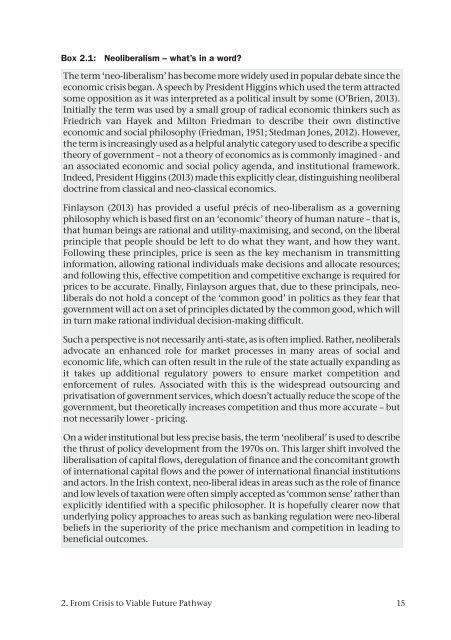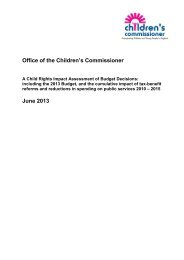2014-04-22 - Socio Economic Review 2014 - Full text and cover - FINAL
2014-04-22 - Socio Economic Review 2014 - Full text and cover - FINAL
2014-04-22 - Socio Economic Review 2014 - Full text and cover - FINAL
You also want an ePaper? Increase the reach of your titles
YUMPU automatically turns print PDFs into web optimized ePapers that Google loves.
Box 2.1: Neoliberalism – what’s in a word?<br />
The term ‘neo-liberalism’ has become more widely used in popular debate since the<br />
economic crisis began. A speech by President Higgins which used the term attracted<br />
some opposition as it was interpreted as a political insult by some (O’Brien, 2013).<br />
Initially the term was used by a small group of radical economic thinkers such as<br />
Friedrich van Hayek <strong>and</strong> Milton Friedman to describe their own distinctive<br />
economic <strong>and</strong> social philosophy (Friedman, 1951; Stedman Jones, 2012). However,<br />
the term is increasingly used as a helpful analytic category used to describe a specific<br />
theory of government – not a theory of economics as is commonly imagined - <strong>and</strong><br />
an associated economic <strong>and</strong> social policy agenda, <strong>and</strong> institutional framework.<br />
Indeed, President Higgins (2013) made this explicitly clear, distinguishing neoliberal<br />
doctrine from classical <strong>and</strong> neo-classical economics.<br />
Finlayson (2013) has provided a useful précis of neo-liberalism as a governing<br />
philosophy which is based first on an ‘economic’ theory of human nature – that is,<br />
that human beings are rational <strong>and</strong> utility-maximising, <strong>and</strong> second, on the liberal<br />
principle that people should be left to do what they want, <strong>and</strong> how they want.<br />
Following these principles, price is seen as the key mechanism in transmitting<br />
information, allowing rational individuals make decisions <strong>and</strong> allocate resources;<br />
<strong>and</strong> following this, effective competition <strong>and</strong> competitive exchange is required for<br />
prices to be accurate. Finally, Finlayson argues that, due to these principals, neoliberals<br />
do not hold a concept of the ‘common good’ in politics as they fear that<br />
government will act on a set of principles dictated by the common good, which will<br />
in turn make rational individual decision-making difficult.<br />
Such a perspective is not necessarily anti-state, as is often implied. Rather, neoliberals<br />
advocate an enhanced role for market processes in many areas of social <strong>and</strong><br />
economic life, which can often result in the rule of the state actually exp<strong>and</strong>ing as<br />
it takes up additional regulatory powers to ensure market competition <strong>and</strong><br />
enforcement of rules. Associated with this is the widespread outsourcing <strong>and</strong><br />
privatisation of government services, which doesn’t actually reduce the scope of the<br />
government, but theoretically increases competition <strong>and</strong> thus more accurate – but<br />
not necessarily lower - pricing.<br />
On a wider institutional but less precise basis, the term ‘neoliberal’ is used to describe<br />
the thrust of policy development from the 1970s on. This larger shift involved the<br />
liberalisation of capital flows, deregulation of finance <strong>and</strong> the concomitant growth<br />
of international capital flows <strong>and</strong> the power of international financial institutions<br />
<strong>and</strong> actors. In the Irish con<strong>text</strong>, neo-liberal ideas in areas such as the role of finance<br />
<strong>and</strong> low levels of taxation were often simply accepted as ‘common sense’ rather than<br />
explicitly identified with a specific philosopher. It is hopefully clearer now that<br />
underlying policy approaches to areas such as banking regulation were neo-liberal<br />
beliefs in the superiority of the price mechanism <strong>and</strong> competition in leading to<br />
beneficial outcomes.<br />
2. From Crisis to Viable Future Pathway 15



